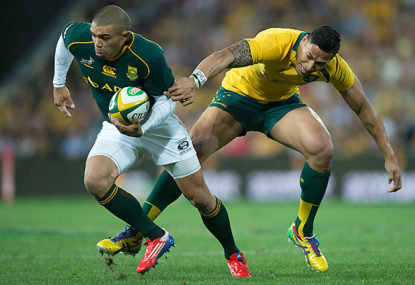Its a topic that’s been much discussed since the last game of the Rugby Championships between South Africa and New Zealand, but I want to have one final crack at the approach South Africa must take in order to evolve their game plan.
Since the appointment of Jake White as Springbok coach in 2004, South Africa has employed a very specific game plan – strangle the opposition up front, bombard them with high kicks just outside their 22, chase hard and force errors.
Play no rugby inside your half and have a solid defence and exit strategy.
It is a basic plan that on the surface suggests there is little risk involved. Until you have a look at the various opponents and how South Africa fared against each of them.
Here are the results of South Africa against France, England, Australia and New Zealand during the tenures of Jake White, Pieter de Villiers and Heyneke Meyer up to last year when the above mentioned game plan was employed.
France.
Played 6, Won 2, Lost 3, Drawn 1
Both teams scored 15 tries
Australia
Played 25, Won 11, Lost 14
South Africa scored 51 tries
Australia scored 64 tries
New Zealand
Played 22, Won 8, Lost 14
South Africa scored 35 tries
New Zealand scored 55 tries
England
Played 13, Won 10, Lost 2, Drawn 1
South Africa scored 37 tries
England scored 13 tries.
I have taken these four teams as they have been South Africa’s greatest challenges in the modern era. England is the odd man out in the statistics above; this is due to the fact that their game plan is very similar to ours.
Our pressure and strangle game has been effective against them.
However when you look at Australia, New Zealand and France, the results show clearly that South Africa struggles with their pressure and strangle game against more adventurous teams.
The fact is you cannot keep defending your line, it is inevitable that teams running at you will find holes in your defence. So providing teams with territory and possession will ultimately provide you with more losses than wins.
You could argue that Morne Steyn and Zane Kirchner have not executed their kicks well and unless you execute this strangle and pressure game to perfection, it is doomed to failure.
If you believe new personnel who will execute the territorial kicking game better will turn the fortunes of South Africa around, then sadly, you are ignoring the most obvious aspect in the failure of this game plan – the opposition.
Yes, those darn guys who decide to improve their aerial ability and actually start learning how to deal with these up-and-unders, teams who use these up-and-unders not only to relieve pressure or set up rucks, but also to counter attack.
Therefore, if you are open-minded enough, you will admit that this game plan is antiquated and has become a liability against Australia, New Zealand and France.
Even with our defensive mind-set we have conceded 2.5 tries per match against New Zealand, Australia and France (New Zealand’s stats being slightly skewed because of 2009).
Conversely South Africa has managed to score only 1.6 tries per match versus New Zealand, 2 tries per match versus Australia and 2.5 tries per match versus France. However France’s statistic is skewed by the six tries scored by South Africa at Newlands in 2010.
I would suggest that after playing the pressure and strangle game for the best part of a decade, we would have pretty much perfected it by now. In other words, there isn’t a lot more that you can add to a defensive game plan after nine years of playing it.
Anything you add to the “strangle and suffocate, kick the leather off the ball and hope they miss it“ game plan will be incremental and hardly noticed.
If these statistics and results do not sway the most closed-minded individual then I am afraid nothing will.
For all these reasons, it is not even debatable that Heyneke Meyer HAS to continue on this path of searching for the ultimate Springbok game plan.
Our nature is to be more cautious, our nature is not to risk the whole farm, most of us will dabble in a little gambling or a small risk high equity portfolio.
So with this in mind, pushing the boundaries further than before is going to take some blind faith, and perhaps a little optimism.
Sure we may lose a few more games (it isn’t like we have been setting the world on fire in the previous nine years either), but this is a journey that we must undertake. We must support Heyneke Meyer in his endeavours to expand our attacking game, even if he experiments a little.
The fact of the matter is, if we want to beat these teams on a regular basis, only by being more attack-minded, will we outscore our opponents. We have only been doing it for a few months, and we are all part of modern society where instant gratification is the only thing we are concerned about.
We must also consider the fact that Australia may be going through a glitch, but they will be back, sooner than you think.
England is improving, their win against New Zealand at Twickenham last year a stark reminder that they are also evolving under Stuart Lancaster.
Maybe this time, it will be worth sacrificing short-term satisfaction for long-term gain.





























































































